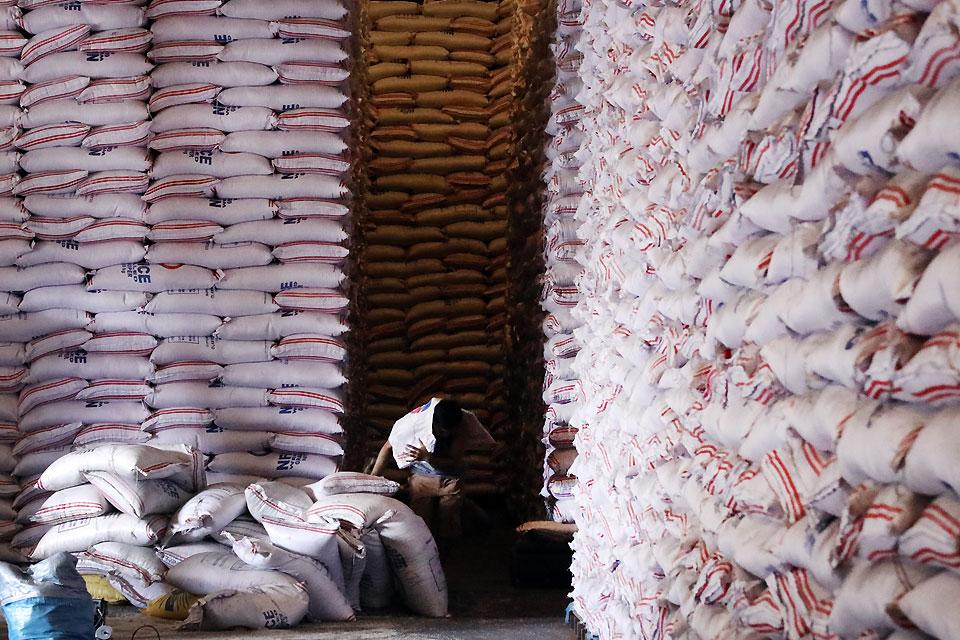House panel OKs bill amending RTL, allows NFA to sell rice

The House panel on agriculture and food on Tuesday approved the bill amending the Rice Tariffication Law to restore the National Food Authority's (NFA) mandate to buy and sell rice.
The committee approved the unnumbered substitute bill a day after President Ferdinand "Bongbong" Marcos Jr. said he would certify the bill as urgent to bring down rice prices, which currently ranges from P50 to P60 per kilo.
"We already had many inputs on these. We have been discussing until late night. Hindi na po makapaghintay ang taumbayan na magkaroon ng sapat at mababang presyo ng bilihin, lalo na ating kinakain araw-araw: bigas," Abono party-list lawmaker Raymund Estrella said as he made a motion to approve the measure.
(We already had many inputs on these. We have been discussing until late night. Our countrymen cannot wait any further to have sufficient commodities at low prices, especially for what we eat daily: rice.)
Executive Director Jayson Cainglet of Samahang Industriya ng Agrikultura, however, cautioned that the bill may be detrimental to farmers in the long run.
"We tend to look only at retail prices. How about farmgate prices? The farmgate prices are high right now. We are cautious that this bill will force farmers to lower farmgate prices so they can sell their yield," Cainglet said.
"Kawawa naman po ang farmers (The farmers will be left in a pitiful state)," Cainglet added.
PSA data
Raul Montemayor, National Business Manager and Program Officer of the Federation of Free Farmers Cooperatives, Inc., agreed with Cainglet that amendments to the RTL should ensure that the tragedies brought about by RTL won’t happen again.
Montemayor said that since the RTL was implemented in 2019, the country has posted a 24-year-low rice sufficiency rate of 77% at the end of 2022, as well as an increased import dependency ratio on rice (imports as a percentage of total supply) at 23% in 2023.
Both these figures are from the state-run Philippine Statistics Authority (PSA).
“The first four years of RTL were hell for farmers. Hopefully, with amendments, this will not happen again,” Montemayor said.
“Let us find a way para hindi baratin ng traders ang farmers,” Montemayor added.
(We should ensure that traders won’t lowball our farmers.)
As it is, Montemayor said that based also on PSA data, the average palay yield in the country is just at 4.17 metric tons per hectare which is behind the RTL target of five metric tons per hectare.
“The palay yield in RCEF areas are good but other areas are falling behind to come up with that kind of average. There is a problem in the implementation of the RCEF,” Montemayor said, referring to the Rice Competitiveness Enhancement Fund provided under RTL.
RCEF is funded by tariffs collected from the imported rice at P10 billion a year for six years.
The current RTL provides that the P10 billion RCEF should be allocated to the following:
- 50 % for rice farm machineries and equipment
- 30% for rice seed development, propagation, and promotion
- 10% for expanded rice credit assistance and
- 10% for rice extension services or services provided by government agencies on rice crop production, farm mechanization and knowledge/technology transfer through farm schools nationwide
Given the RCEF menu, Montemayor then suggested that RTL amendments should include:
- More flexible allocation of RCEF to address location-specific requirements and preferences
- Ensuring sustainability of machinery distribution program
- Strengthening seed producer associations
- Use of credit funds for interest rate or crop insurance premium subsidies
- Provide additional funding for common service facilities (post-harvest facility, soil and plant laboratories, among others.)
“As it is the allocation distribution under RCEF is not responsive to the needs on the ground. Other areas might not have problems in mechanization or seeds. The support they want is not on the menu,” Montemayor said.
“We should figure out a way how to accommodate them,” Montemayor added.
Appeal to Senate
Speaker Martin Romualdez earlier said the House of Representatives would pass the bill amending the RTL so that market prices of rice would fall by P10 to P15 per kilo by June.
The RTL allows unlimited entry of imported rice in the country, envisioned to bring down the prices of rice due to larger supply. Likewise, the same law bans the NFA from buying and selling rice and limits its mandate to managing buffer rice stocks.
House Deputy Majority Leader Erwin Tulfo, for his part, called on the Senate to act on the proposed bill with the same urgency by adopting the House’s version of the bill.
“We appeal on the Senate to adopt our version. Let’s set aside business interest, personal interests. We should prioritize public interest,” Tulfo said.
“Marami ho tayong mga kababayan nagugutom. We have to do something about this. We have the power in our hands, ladies and gentlemen,” he stressed,” Tulfo added.
The Department of Agriculture (DA) on Sunday said it supported the proposal to restore the NFA's authority to buy and sell rice, saying the government has been unable to respond to some situations when rice prices become high.
Last April, Agriculture Secretary Francisco Tiu Laurel Jr. expressed support for the proposed extension of the RTL for another six years. The law is set to expire next year.
According to the Department of Agriculture (DA), Tiu Laurel was pushing for a higher allocation for improving the competitiveness of farmers, and for projects to include post-harvest facilities that could boost rice recovery.
The Rice Tariffication Law took effect on March 5, 2019, after it was signed by former President Rodrigo Duterte under Republic Act 11203 in February of the same year.
— VDV/ VAL, GMA Integrated News




